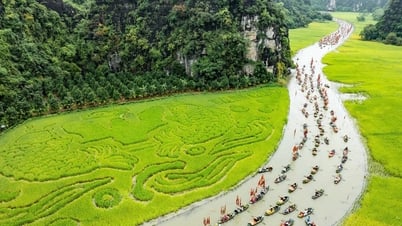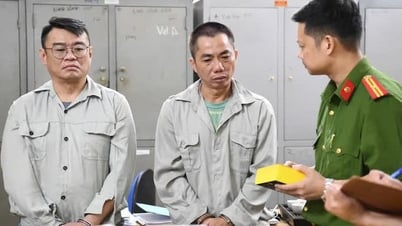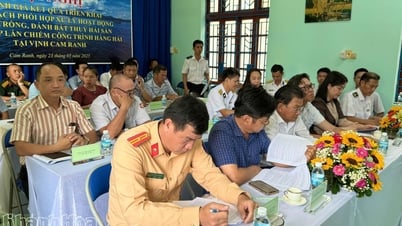
The land economics major will start enrolling students from 2025 with 50 positions. In the photo: Master Cu Xuan Tien - Head of Admissions and Student Affairs Department of the University of Economics and Law (Ho Chi Minh City National University) - shares admission information with students at the Admissions and Career Counseling Day 2025 - Photo: TRAN HUYNH
Land Economics is an interdisciplinary training program jointly developed by the Department of Geology, University of Natural Sciences and the University of Economics and Law (Ho Chi Minh City National University).
What to learn when choosing land economics?
The training of land economics marks the next step in the interdisciplinary and inter-school training model, aiming to maximize the resources of units under the Ho Chi Minh City National University system.
Land economics major starts enrolling from 2025 with 50 quotas. Admission is based on the following combinations: A00, A01, A06, A07, B00, B02, C01, C02, C04, D01, D07, D10, X02, X26.
According to Dr. Ho Thu Hien - Department of Geology, University of Natural Sciences, the training program in land economics combines knowledge blocks of economics, management, law and Earth science.
The courses are designed to provide the necessary specialized knowledge in the fields of land management, real estate, economics and some courses are specifically designed for this field of study.
General subjects include subjects in natural sciences and socio-economics, including: introduction to law, innovation and entrepreneurship, personal finance...
In addition, students are also equipped with knowledge blocks: industry foundations (Earth science, cartography, geodesy and cadastral mapping, data science, statistics in business, remote sensing and GIS applications in land management, economics, business accounting, economic mathematics, land law, housing and real estate business law, investment project establishment and appraisal...).
Specialized knowledge block (land finance and economics, land and real estate valuation, real estate investment, cultural geography, land management adapting to climate change, land policy and economic development...).
In addition to broad and in-depth background knowledge, land economics students are also equipped with working skills, adapting well to the needs of the labor market: using measuring equipment, applying information technology, analyzing data and forecasting; working independently and in groups; making, organizing and implementing plans and managing projects, risk management...
What to do with a degree in land economics?
According to MSc. Hoang Thanh Tu - Deputy Head of Information and Communication Department, University of Natural Sciences, the demand for digital transformation and human resources in the land economy sector in Vietnam is currently increasing and is forecast to continue to increase in the future, especially in the context of new legal policies and the development of the real estate market.
"With changes in legal policies and the development of the real estate market, the land economy promises to bring many attractive career opportunities for those who are interested and have a development orientation in this field," Ms. Tu shared.
In addition, the sector also plays an important role in developing sustainable economic models such as circular economy in land use. Complex issues such as rapid urbanization, land use rights allocation and land dispute resolution require a combination of economic knowledge and natural sciences.
Land economics provides a foundation for analyzing land use policies and proposing strategic solutions to reduce resource waste and optimize land value. It is particularly well-suited to support policy development in the context of a country's transition to a green and sustainable economy.
Bachelor of Land Economics is trained to become an expert in the field of land planning, valuation, business and management, one of the key areas of national sustainable development.
"After graduation, students can work at government agencies, real estate enterprises, banks, planning consulting companies, or start a business in the land and real estate sector. This field of study is especially suitable in the context of digital economy, green development and the increasing demand for effective management of land resources," Ms. Hien added.
Students can study two majors.
The land economics training program has a total of 130 credits. Students who accumulate enough credits will be awarded a bachelor's degree in land economics by the University of Natural Sciences.
The two schools consider recognizing each other's transfer credits, depending on the regulations of each unit.
Students can study two majors or two degrees depending on the regulations of each unit. The University of Natural Sciences considers and grants a land economics diploma, the School of Economics and Law grants a bachelor's degree in economics if students accumulate an additional 29 credits according to the regulations of the inter-university interdisciplinary program.
Source: https://tuoitre.vn/nganh-kinh-te-dat-dai-lan-dau-tien-duoc-dao-tao-tai-viet-nam-20250523201416401.htm


![[Photo] Anh Hoang - Dinh Duc successfully defended the men's doubles championship of the National Table Tennis Championship of Nhan Dan Newspaper](https://vphoto.vietnam.vn/thumb/1200x675/vietnam/resource/IMAGE/2025/5/23/d6ab3bcac02c49928b38c729d795cac6)




![[Photo] Top players gather at the 2025 Nhan Dan Newspaper National Table Tennis Championship](https://vphoto.vietnam.vn/thumb/1200x675/vietnam/resource/IMAGE/2025/5/23/9ad5f6f4faf146b08335e5c446edb107)






















































































Comment (0)